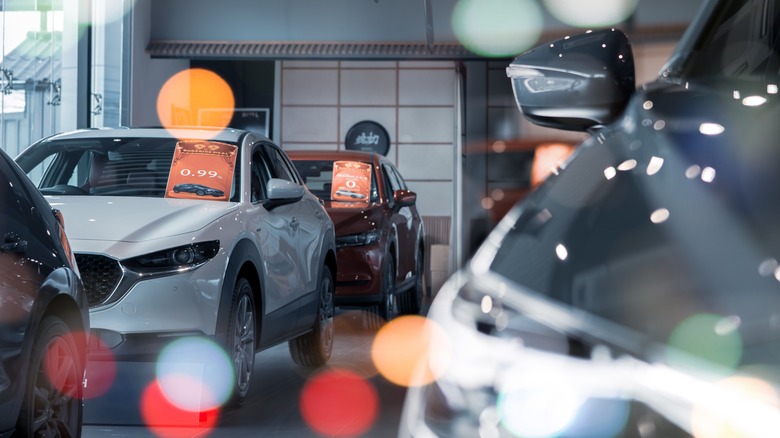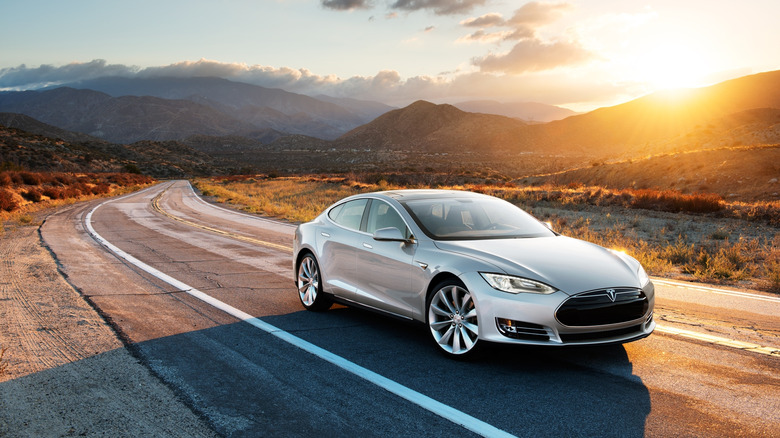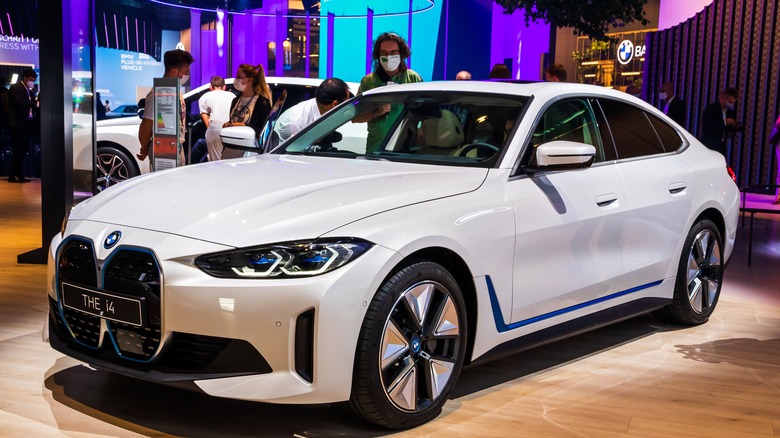Buying Vs Leasing An EV: Which Option Is Better For You?
Once a driver has made up his mind about driving electric, the next obvious question arises: lease or buy? According to a Bloomberg report published by Inside EVs, by 2018 almost 80% of electric cars in the U.S. were leased. While the study did not include Tesla, the number is still expected to be high, as Tesla's leasing offers are very attractive to potential customers.
The EV models that offer the best deals for leasing are also those that offer the best deals to buy. These include the Nissan Leaf, Mini Cooper Electric Hardtop, Chevrolet Bolt, the Hyundai Ioniq 5, and some Kia models. Cars like the Tesla Model S, which sells for $99,900, or the Tesla Model Y, which sells for $62,900, are on the expensive side for both leasing and buying. Additionally, driven by inflation, gas prices, and supply chain issues, Tesla increased the price for all its models, as reported by The Verge. Leasing or buying are two different ways to get behind the wheel of an electric car, and both have their own specific pros and cons. It is important for customers to understand the basics of leasing and buying that apply to traditional gas cars do not apply to all-electrics.
Buying or leasing an EV: What's the difference?
The purchase of an all-electric car can be done in one payment or in monthly installments. Buying EVs on average is more expensive than buying a traditional gas car. Kelly Blue Book sets the average transaction for an EV purchase for November 2021 at $56,437. Compared to the average transaction for the purchase of a traditional Compact car, set at $25,650, or even a gas SUV or Crossover at $33,392, the barrier to entry to buy an EV is high.
On the other hand, leasing an EV is like renting it but for an extended period of time. All EV makers today offer leasing opportunities to attract more clients. Leasing contracts are usually drawn up for two or four years. Leasing a car removes the hassle of selling or trading the car. But when leasing, the customer never owns the vehicle. However, some leasing contracts do have an option to purchase the EV once the contract is concluded.
Pros and cons of leasing an EV
To understand why many customers choose to lease, we can look at how carmakers have made this option attractive. For example, a Tesla Model 3 that sells for $57,490 can be purchased in 72 monthly installments of just $728 with a $4,500 down payment. Leasing the same Tesla Model 3 requires $5,854 when signing, and a maximum of 36 monthly installments of $659. From a buyer's perspective, it is easy to see the immediate economic benefits. But, there are other factors that need to be penciled out.
Consumer Reports highlights three other reasons that are favorable for those who want to lease. Leasing contracts last a couple of years, this allows customers to get their hands on the latest technology. Another reason is tax credits. Many leasing companies transfer tax credits to their customers to make leasing even more appealing. Finally, a big factor in favor of leasing is the loss of value or depreciation of an EV. "A [EV] vehicle usually loses around 50 percent of its value in three years," Mel Yu, a Consumer Reports auto analyst explains. Yu adds that once that period of depreciation has passed, those who bought the car can even owe more on their loan than what the vehicle is worth. Depreciation of an EV is much steeper than in traditional gas cars.
Car Buzz explains that despite all its pros, leasing does have some downsides. Tax, insurance, lease fees, and some of the depreciation value, are included in lease payments. Leasing contracts also have penalties for late payments or early terminations, as well as limitations on mileage, maintenance, or wear-and-tear. However, the major turn-off for customers when considering leasing is that no matter how beneficial the contract is, they do not own the car they drive.
Buying an EV: Pros versus cons
The main benefit of buying an EV, especially if a customer is buying quality, is ownership. While the all-electric market is still too young to have a strong classic EV segment, eventually some EVs will become classics and could be very valuable. Those who buy a car can also personalize it, drive as long as they want, are not bound to a contract of wear-and-tear, and will never have to return the vehicle.
Another benefit of buying an EV is that terminating a contract of purchase is as easy as selling the car. However, Technology advancements play against buyers. EV batteries, range, performance, top speeds, autonomous technology, and the explosion of competition between different brands releasing different models make it more convenient to drive an all-electric for a couple of years and then simply upgrade it for a new model.
EV maintenance — myths, and realities — also negatively impact the perception of potential buyers. Most drivers are not fully aware of how an electric car is maintained, they can be spooked by costly battery changes, or are unaware of how long an electric car will run before it degrades. Finally, if we add all these factors to the lower costs of leasing a car, we begin to understand the unfavorable conditions for buyers.
Buy or lease an EV: Conclusion
In the end, buying or leasing an EV is a very personal decision. For those who are on a tight budget but still feel the rush to go electric, leasing seems the best way to go. For those who do have the money and want an EV because they admire the state-of-the-art design, technology, and engineering buying is the perfect option.
Having the right information can also help decide. Car Buzz explains that an EV battery on average will run 200,000 miles before degrading, and the first 100,000 miles are usually covered in full by a warranty. Just like batteries are low risk, EV maintenance in general is usually low risk as well. For those who are thinking about leasing just because of EV maintenance anxiety, getting the best information before making that decision is recommended.
Many are looking to buy an EV in the near future. They should be aware that new models are always coming out and as EVs become mainstream, better and more affordable options to buy will hit the market. Additionally, laws to reform federal tax for EVs are also gaining traction and could be as high as $12,500, as reported by Reuters. In conclusion, the price of an all-electric car can be high to purchase, but monthly installments, tax, incentives, and gas savings, serve both buyers and those who lease. If on a tighter budget, looking to upgrade in a few years, or prevent maintenance or selling process, leasing is the perfect road. On the other hand, buying may not look good on paper for most, but sometimes buying a car is not about the numbers at all.




